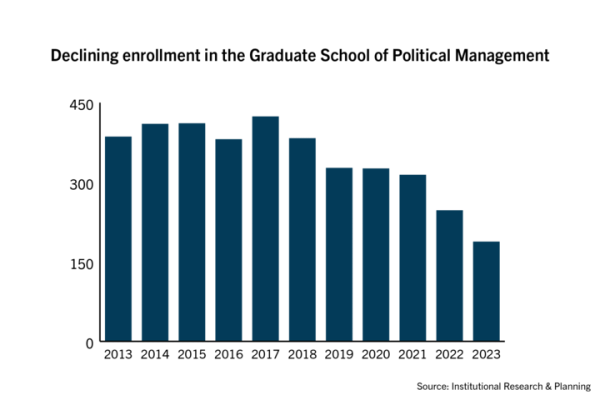Updated: April 15, 2024, at 12:13 p.m.
Since the director of the Graduate School of Political Management left in August 2022, faculty, students and other stakeholders have waited for officials to name a replacement.
Nearly two years later, the position remains vacant, and the GSPM’s Board of Advisors — a 20-person team that pays dues to the school and advocates on its behalf — is working to increase funding, recruitment and faculty hires after the school’s enrollment fell 24 percent between 2022 and 2023, marking six-consecutive years of declining enrollment. College of Professional Studies Dean Liesl Riddle said the college, which houses GSPM, plans to hire a director through “continued strategic efforts and pending increased enrollment.”
Enrollment drops in GSPM align with declining enrollment in CPS, which enrolled 624 students in 2023 compared to 1,051 in 2013. GSPM’s enrollment dropped from 386 students in 2013 to 188 in 2023, according to the enrollment dashboard. 171 students attended GSPM programs as of this spring, according to documents obtained by The Hatchet.
“CPS is the very proud home of GSPM, and our students and faculty are some of the best and brightest working in the political arena today,” Riddle said in an email. “We plan to continue to collaborate closely with alumni networks, industry partners, and faculty members to amplify the reach of recruitment efforts and enhance the overall appeal of GSPM programs.”
Riddle, who was named the dean of CPS in August 2022 after the college went almost two years without a permanent leader, declined to comment on when officials intend to fill the GSPM director position and if the plans have been communicated to staff, faculty and students.
A University spokesperson said since Riddle started her tenure, she expanded curriculum offerings in programs like strategic public relations and completed an academic performance review of the master’s of professional studies degree in publishing management. The spokesperson said she also implemented a series of recruitment strategies to grow enrollment in CPS and GSPM, including partnerships with organizations like the National Association of Counties and the American Association of Political Consultants, to market the college.
To attract more applicants to GSPM, Riddle also launched digital advertising for all programs and created a commercial featuring the school’s Board of Advisers, the spokesperson said.
But GSPM community members said without a leader, the school is struggling to grow its visibility and distinguish itself from CPS. And though stakeholders have advocated for a new director, details on the hiring plan remain unclear, they said.
Christopher Arterton, the founding dean of GSPM which was established in 1987, said it is difficult to increase GSPM’s marketing and funding without a director. He said GSPM is technically a standalone school housed within CPS, but the lack of a permanent leader has led the college to envelop GSPM.
“Having somebody at the core running the school as a director is important to give throw weight or a focal point to the school so that it’s all working together and advancing and having the pieces of the school reinforce each other,” Arterton said.
Arterton said the Columbian College of Arts & Sciences acquired GSPM in 1996 after operating as an independent school since 1987. When he decided to bring the school into CPS in 2006, he said he had the ultimate goal of GSPM growing to the point where it would become an independent school like GW Law and the School of Business.
He said GSPM students contributed to a large portion of enrollment for CPS, which makes the school a valuable asset to the college. In 2013, GSPM students accounted for 36.7 percent of total CPS enrollment and 30.1 percent of enrollments in 2023, according to the University’s enrollment dashboard.
“I think that the powers that be, without ever saying, are going to not take the steps necessary to nurture the school,” Arterton said. “I think there was somewhat of a reluctance to figure out how that could ever take place in a way that wouldn’t damage the college significantly.”

Matt Chase, a board member and the executive director of the NAC, said members have kept their desire to hire a director “front and center.” He said advisers have talked with Riddle about the qualities they want in a director, like political career experience.
“We have not let this slip off the radar,” Chase said. “We are advisers, we’re not a board of directors. Once our advice is given, I can’t tell you what is truly happening with that advice.”
Chase said in the long run, the school needs a director to oversee enrollment and hiring, but the board also has three subcommittees focused on enrollment and recruiting adjunct professors, updating the curriculum and building alliances with other universities and big employers to feed more students into GSPM.
“It’s a short-term fix,” Chase said. “I don’t think the majority of the board sees that as the long-term.”
Julius Hobson Jr., a GSPM adjunct professor and a board member, said the school needs to raise money for an endowed chair who can hire a director to serve as the “face of the school” and guide GSPM-specific initiatives, fundraising and recruitment.
“We need a prominent person to sit in a chair who can raise money and attract students, but we need money to pay them at a rate that’s reasonable, and that’s the problem that I see,” Hobson said.
During the 2022-23 academic year, CPS associate professors earned an average salary of $108,549, the lowest average compensation for the same role out of nine of GW’s schools, according to the University’s 2024 core indicators report. Assistant professors earned $100,647, the fourth-lowest average salary among other schools for the same role. All CPS faculty, including those in GSPM, are contract faculty.

A GSPM graduate student who requested anonymity for fear of retribution from the University said since the former director’s departure, GSPM has fallen into a trend of lagging enrollment and canceled classes. The student said the delays in replacing the school’s director have contributed to the decline.
The student said a director with experience in politics who can leverage personal relationships will allow the school to expand its course offerings, hire more faculty and invite speakers who understand the needs of a political program from a practitioner’s perspective. Riddle, who started her tenure at GW in 2001 as an assistant professor of international business and international affairs, served as the vice dean for strategy in GWSB before she was appointed the dean of CPS.
Selby Bush Lilley, a board member and the regional vice president of external affairs and communications for Sempra Infrastructure, said advisers would like officials to hire a new director but recognize that finding the “right person” takes time. She said the board is talking with CPS officials about finding a director who understands GSPM’s mission of teaching students how to debate and discuss politics.
Lilley said that in the absence of a director, the board has “stepped up” to help lead the school. She said she doesn’t know if the work they are doing is “filling in the gap” but members are working to market the school to interested students.
“I don’t think we’ve put a timeline around it,” Lilley said, referencing the plan to hire a GSPM director.
Lara Brown, GSPM’s most recent director who served from July 2016 to August 2022, said the school is “perfectly situated” to help the University grow its regional presence and national prominence. She said GW has the opportunity to expand GSPM’s offerings.
“It remains my hope that the school — its students, faculty, staff, and alumni — will receive the University’s full support, so that it can continue to grow and flourish,” Brown said in an email.
This post was updated to reflect the following:
The Hatchet incorrectly reported that Riddle expanded course offerings in the master’s of professional studies degree in publishing management. She completed an academic performance review of the program. We regret this error.





